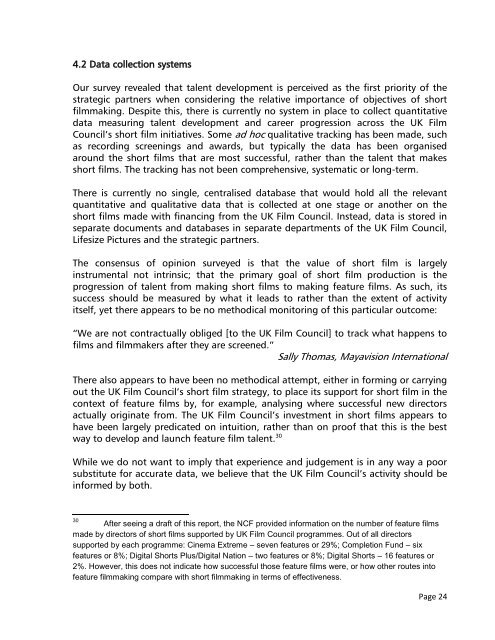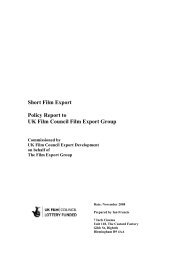Northern Alliance - BFI
Northern Alliance - BFI
Northern Alliance - BFI
You also want an ePaper? Increase the reach of your titles
YUMPU automatically turns print PDFs into web optimized ePapers that Google loves.
4.2 Data collection systems<br />
Our survey revealed that talent development is perceived as the first priority of the<br />
strategic partners when considering the relative importance of objectives of short<br />
filmmaking. Despite this, there is currently no system in place to collect quantitative<br />
data measuring talent development and career progression across the UK Film<br />
Council‟s short film initiatives. Some ad hoc qualitative tracking has been made, such<br />
as recording screenings and awards, but typically the data has been organised<br />
around the short films that are most successful, rather than the talent that makes<br />
short films. The tracking has not been comprehensive, systematic or long-term.<br />
There is currently no single, centralised database that would hold all the relevant<br />
quantitative and qualitative data that is collected at one stage or another on the<br />
short films made with financing from the UK Film Council. Instead, data is stored in<br />
separate documents and databases in separate departments of the UK Film Council,<br />
Lifesize Pictures and the strategic partners.<br />
The consensus of opinion surveyed is that the value of short film is largely<br />
instrumental not intrinsic; that the primary goal of short film production is the<br />
progression of talent from making short films to making feature films. As such, its<br />
success should be measured by what it leads to rather than the extent of activity<br />
itself, yet there appears to be no methodical monitoring of this particular outcome:<br />
“We are not contractually obliged [to the UK Film Council] to track what happens to<br />
films and filmmakers after they are screened.”<br />
Sally Thomas, Mayavision International<br />
There also appears to have been no methodical attempt, either in forming or carrying<br />
out the UK Film Council‟s short film strategy, to place its support for short film in the<br />
context of feature films by, for example, analysing where successful new directors<br />
actually originate from. The UK Film Council‟s investment in short films appears to<br />
have been largely predicated on intuition, rather than on proof that this is the best<br />
way to develop and launch feature film talent. 30<br />
While we do not want to imply that experience and judgement is in any way a poor<br />
substitute for accurate data, we believe that the UK Film Council‟s activity should be<br />
informed by both.<br />
30 After seeing a draft of this report, the NCF provided information on the number of feature films<br />
made by directors of short films supported by UK Film Council programmes. Out of all directors<br />
supported by each programme: Cinema Extreme – seven features or 29%; Completion Fund – six<br />
features or 8%; Digital Shorts Plus/Digital Nation – two features or 8%; Digital Shorts – 16 features or<br />
2%. However, this does not indicate how successful those feature films were, or how other routes into<br />
feature filmmaking compare with short filmmaking in terms of effectiveness.<br />
Page 24
















